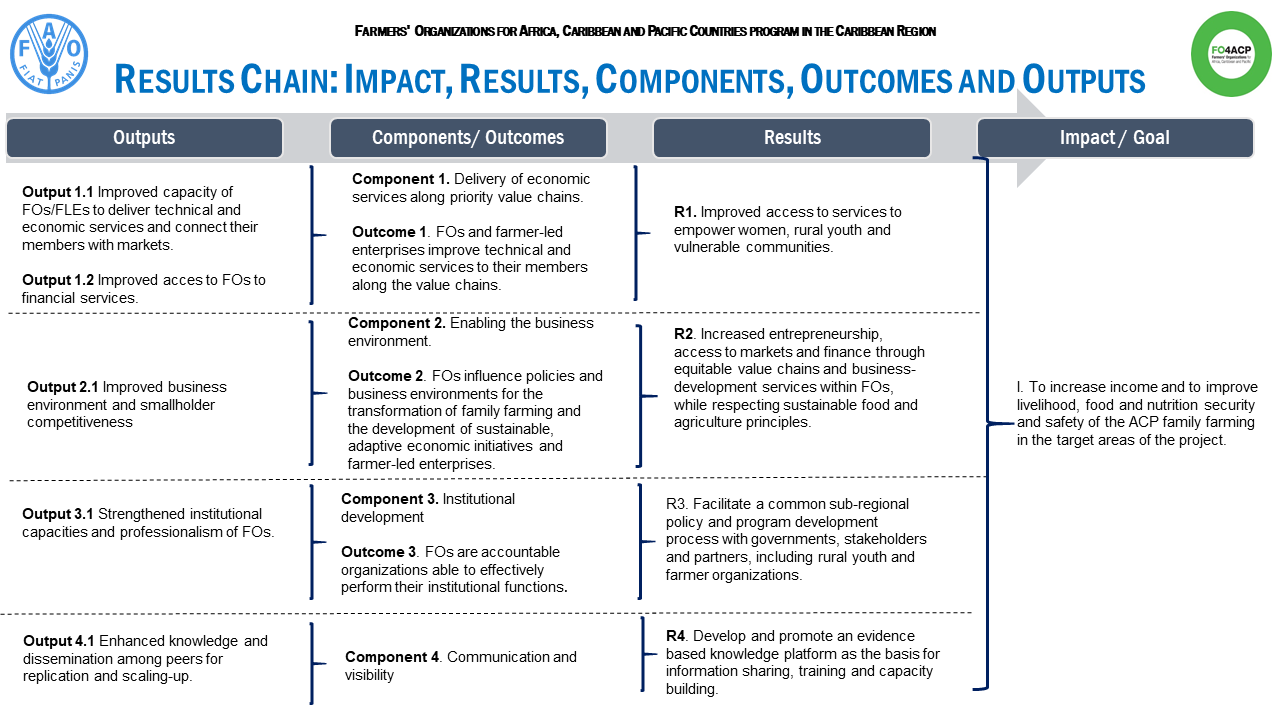Logical Framework

The overall structure for the FO4ACP in the Caribbean is aligned with the global goal and expected results.
The implementation strategy puts knowledge management at the center of operations and as described in each component will be mapping, capitalizing, disseminating and supporting the scaling up of existing and new knowledge and information. Moreover, the FO4ACP in the Caribbean takes into consideration the lessons learned in Africa and Asia and the Pacific regarding knowledge management activities as key for the articulation between steering commitees for strategic guidance, platforms collaboration and organizations peer to peer learning.
Knowledge co-generation, capitalization and dissemination will be anchored at the national level, mainly through applied research and peer learning, with a few flagship publications and high level events targeting the regional and inter-regional levels. Moreover, the project will promote open learning and therefore expects to build upon the knowledge offer of sister projects in Asia and the Pacific and Africa and other relevant adding value ongoing investments and initiatives.
Finally, the sustainability of FO4ACP in the Caribbean will be ensured by the increased ownership of the FOs and their improved capacity to effectively serve their members, as well as by promoting profitable economic activities for FOs. Also, specific work will be done in order to develop an enabling environment for strengthening Farmers Organization through effective public policies and programs, ensuring spaces for cooperation and exchange of experience, as well as a dialogue-basis design and implementation of them.
Overall goal
- To increase income and to improve livelihood, food and nutrition security and safety of the ACP family farming in the target areas of the project.
Objectives (Expected Results)
- Improved access to services to empower women, rural youth and vulnerable communities.
- Increased entrepreneurship, access to markets and finance through equitable value chains and business- development services within FOs, while respecting sustainable food and agriculture principles
- Facilitate a common sub-regional policy and program development process with governments, stakeholders and partners, including rural youth and farmer organizations.
- Develop and promote an evidence based knowledge platform as the basis for information sharing, training and capacity building.
Components
- Delivery of economic services along priority value chains
The objective of this component is to provide updated knowledge and information in each of the selected countries especially on the current situation of organizations of small-scale rural producers, including: i) detailed analysis of the participation of women and youths, ii) identification, characterization and selection of the most relevant value chains for family farmers, iii) proposed actions for strengthening the capacities of small-scale producers to improve their inclusion, iii) prioritization of youths and women, as well as facilitating their participation and, iv) establishment of collaboration and innovation networks.
- Enabling the business environment.
The objective of this component is to facilitate policies, regulations and financial commitments in favour of a business environment conducive to family farmers and their associations, with emphasis on relevant areas to improve their inclusion in value chains, including agricultural and commercial policies, the generation of decent employment and access to land, especially for women and youths, access to rural financial services and, development of entrepreneurial capacity and better governance of value chains.
- Institutional development
Its objective is to stimulate associativism among small family producers by strengthening the capacity of organizations to function regularly, the expansion of their membership and the improvement of their management and governance mechanisms.
- Communication and visibility
Its objective will be to visibilize the relevance of family farming associations and their contribution to the construction of sustainable agri-food systems through their better participation in value chains, aligned with the communications strategy of the FO4ACP Programme and the recommendations of the Global Plan of Action for the Family Farming Decade.
Expected outcomes
- FOs and farmer-led enterprises improve technical and economic services to their members along the value chains.
- FOs influence policies and business environments for the transformation of family farming and the development of sustainable, adaptive economic initiatives and farmer-led enterprises;
- FOs are accountable organizations able to perform their institutional functions.
Expected outputs
- Improved capacity of FOs to deliver technical and economic services and connect their members to markets;
- Improved access of FOs to financial services;
- Improved business environment and smallholder competitiveness;
- Strengthened institutional capacities and professionalism of FOs;
- Enhanced knowledge and dissemination among peers for replication and scaling-up.

